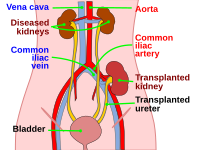
Photo from wikipedia
The advent of novel sensitive assays assessing circulating anti‐human leukocyte antigen (HLA) antibodies has allowed recognizing humoral alloimmunity as the main immune‐mediated mechanism responsible for allograft rejection and graft loss… Click to show full abstract
The advent of novel sensitive assays assessing circulating anti‐human leukocyte antigen (HLA) antibodies has allowed recognizing humoral alloimmunity as the main immune‐mediated mechanism responsible for allograft rejection and graft loss in kidney transplantation. However, current immune‐monitoring techniques, exclusively focusing on circulating anti‐HLA antibodies, may underestimate the magnitude of humoral immune response as they exclude the memory B‐cell (mBC) pool. Different biological compartments are involved in the intricate mechanisms triggering humoral alloimmune responses even in absence of detectable circulating alloantibodies. Recent studies in animal models as well as in clinical kidney transplantation have shown the key role of this B‐cell subset triggering allograft rejection, thus emphasizing the value of recognizing antidonor mBC both as a biomarker of allosensitization and as therapeutic targets. Therefore, considerable efforts are being made among the transplant research community to better understand the role, hierarchy, and impact of mBC in the context of organ transplantation. In this review article, we provide a deep insight into the biology of mBC as well as main evidence of their role orchestrating allograft rejection. Also, we provide a thorough description of main immune‐monitoring tools aiming at tracking mBC and a rational for their potential use to refine current humoral immune‐risk assessment in kidney transplantation.
Journal Title: Transplant International
Year Published: 2017
Link to full text (if available)
Share on Social Media: Sign Up to like & get
recommendations!